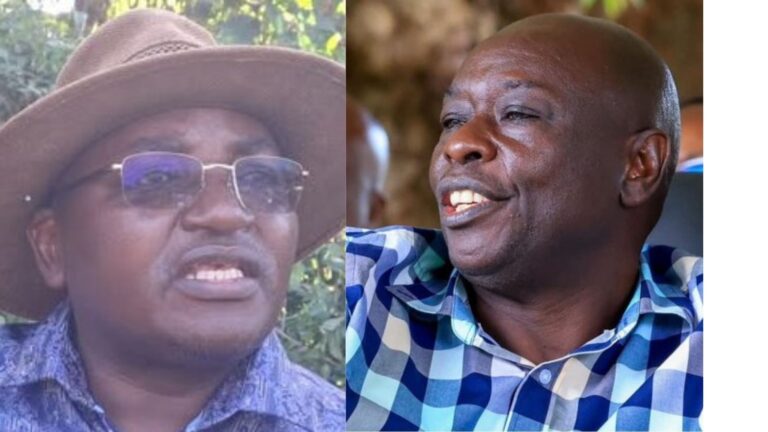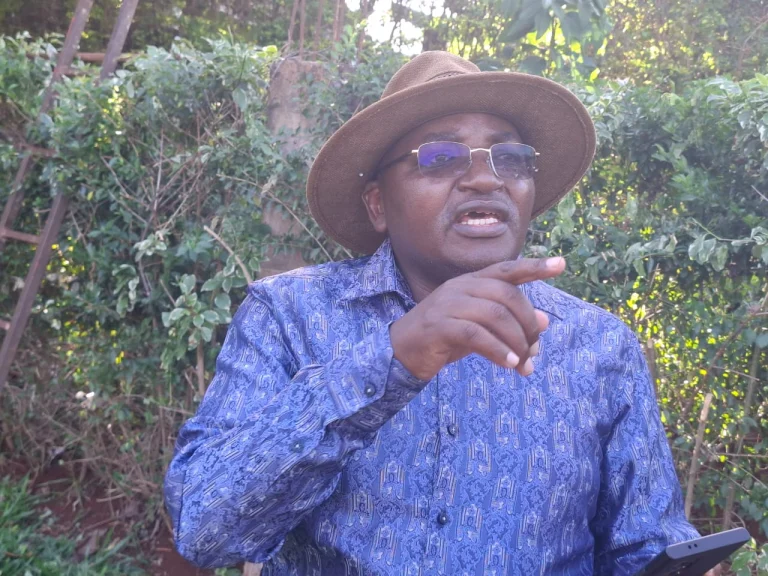
President William Ruto addresses his supporters at Nanyuki, Laikipia County, on April 1, 2025. Photo/PCS
By Wanderi Kamau
After just five months, President William Ruto is set to return to the Mt Kenya region in August, in what has been billed by State House as a “working tour.”
According to sources within State House who spoke to Newsflash, the President is expected to assess the progress of key development projects initiated across the region. His previous tour was in March this year.
While the official narrative paints the visit as a development follow-up, political analysts and insiders believe the trip is far more politically motivated than acknowledged.
Observers suggest the President is engaged in a delicate mission to reclaim political ground in a region that once overwhelmingly backed his 2022 presidential bid, but has recently grown more critical and distanced.
“The President is expected to return to Central Kenya, because that is his responsibility to follow up on the promises he gave to Kenyans and the Central Kenya locals. The buck stops with him,” said Mathira MP Eric Wamumbi, a close Ruto ally.
Wamumbi’s remarks underscore the developmental justification for the trip, but they also allude to the accountability demands from a region increasingly expressing disillusionment with the Kenya Kwanza administration.
Discontent has been rising over stalled infrastructure projects, economic hardships, and accusations of political persecution, particularly against former Deputy President Rigathi Gachagua, who hails from the region.
Political rift widens
Laikipia East MP Mwangi Kiunjuri, also aligned to Ruto, offered a more politically charged assessment of the visit. He signaled a readiness within Mt Kenya to politically confront those seen as having sidelined regional interests.
“We, as the Mt Kenya region—someone might think that we have been ostracized. We were just silent for some time. Rigathi [Gachagua] had dismissed us. We have started removing our claws. From August, we shall deal with him. He is not a man than other men.”
Kiunjuri’s bold statement reflects the undercurrents of rebellion and growing frustration within parts of Mt Kenya’s political class, especially those allied to Gachagua. They accuse the President of sidelining their man and punishing the region politically for its internal dissent.
Read more: Ruto’s itinerary for Mt Kenya tour released
That position is echoed by Mukurwe-ini MP John Kagucia, a staunch Gachagua loyalist, who questioned the very basis of the President’s return.
“Which projects are they saying he will come to launch? If he has not disbursed monies to construct roads that were started in Kieni, Laikipia, Mathira, Nyeri and Mukurwe-ini, which other roads are people saying he will come to launch? Which projects are they saying he will come to launch, if all the projects in Mt Kenya stalled?”
His critique was compounded by Embakasi North MP James Gakuya, who made even more scathing remarks.
“When money comes, we shall not let it be returned. Let people enjoy their money. That is the money he has stolen. Don’t allow William to return to Sugoi with the money, because he has got the money from us.”
These voices reveal the depth of the political fracture, with Gachagua allies turning the heat on Ruto and demanding accountability—both financial and political—before any political truce can be brokered.
Demands for apology
Ruto’s road back to Mt Kenya, according to his critics, is paved with conditions. Gachagua’s loyalists insist that the President must apologize to the region, not only for alleged neglect but also for the political intimidation and violence they claim has been visited upon its people.
“The political card the President can play is to order an end to the use of goons (state militia). He must allow leaders to carry out their political activities without being intimidated with goons. He must allow Rigathi Gachagua to operate freely without being sent goons. The youth must be allowed to freely express themselves without being sent state militia,” says Kagucia.
He further adds:
“He must order all people who have been persecuted by the state to be resurrected or their families be compensated. The State must accept responsibility in their deaths, apologise and compensate their families.”
These are heavy demands, suggesting not just political fallout but a loss of trust in state institutions under Ruto’s watch. They paint a grim picture of a political base feeling alienated, victimized, and in search of restitution.
Is the tide turning?
Despite this hostility, Wamumbi maintains that the tide is turning in Ruto’s favor.
“The people have changed their previous political stand. There was a time they were so angry, but they have made an about-turn. They have chosen someone who is working for them rather than a leader who is always saying ‘One term’. People now want work,” he said.

Yet, political analysts warn that the region’s loyalty may not be easily won back. Since Ruto’s last visit in March, several interventions—including empowerment programs that have seen billions of shillings pumped into the region—have done little to reverse the mounting skepticism.
“It might be difficult to reclaim the region,” notes Charles Wachira, a political analyst.
Read more: Mungiki unleashed to mobilise support for Ruto Mt Kenya tour
Wachira argues that while the government has tried to woo locals with economic programs, trust has eroded too deeply. The perception that development is being used as a political bribe is increasingly taking root.
DCP party leader Cleophas Malala echoes this sentiment.
“We are certain that government cannot win anything in Mt Kenya… even if Ruto makes numerous trips.”
As President Ruto prepares for his August tour, it is clear that he is stepping into a politically volatile region, where developmental promises alone may not suffice.
According to political analysts, if the visit is to succeed in reviving his political fortunes, it will require not just ribbon-cutting and road launches, but also genuine political engagement, reconciliatory gestures, and a firm commitment to addressing long-standing grievances.
Otherwise, Mt Kenya might remain a political fortress—one that is closed to its former ally.



